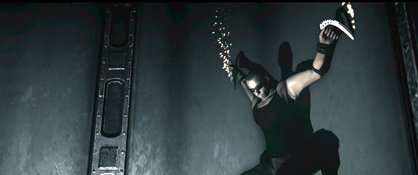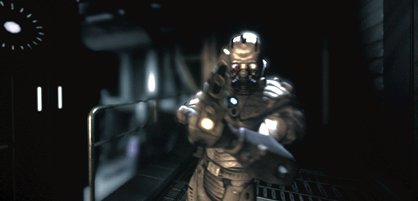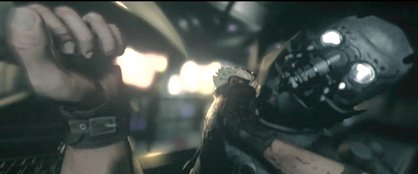For a murderous escaped convict, Richard B. Riddick has an uncanny habit of being roped in to save the day. His big-screen debut was in Pitch Black, a sci-fi epic which dumped him on a planet infested with carnivorous aliens. In the sequel, The Chronicles of Riddick, he faced off with a marauding galactic empire, the evil-sounding (and doing) Necromongers. However, it was only when Activision decided to drop Assault on Dark Athena from its release list that the growling anti-hero looked like he’d met his match. Fortunately, for everyone who loves a good FPS, Atari was lurking in the darkness, ready to pick up the pieces.

Dark Athena started life as a short expansion to complement the re-release of The Chronicles of Riddick: Escape from Butcher Bay. Riddick’s first videogame adventure was only released on the old Xbox and PC and didn’t reach as wide an audience as it deserved. Not only was Butcher Bay ahead of the times graphically, it was also one of the first FPSes to focus on melee combat and stealth. The rave reviews it received at the time must have given developer Starbreeze some confidence that a re-release could be successful, even without a new movie to back it up. Frankly we always preferred the game to the movies anyway. And the really great news is that Dark Athena is now much more than an expansion. Under Atari’s wing, it’s been boosted up to a full ten-hour campaign, bundled alongside the original game for extra value.
Butcher Bay is a ‘triple slam’ prison, deemed inescapable by everyone who runs it. They obviously never counted on a man with surgically-enhanced eyes that can see in the dark, and is also one of the last of a race of ancient warriors. There’s so much about this game that still shines with originality. Because most of the guard’s weapons are DNA locked, you spend much of the time creeping around the shadows before stabbing them in the throat with an assortment of space shiv. For entire sections of the game, there’s very little gunplay at all. But Riddick is always the kind of character who prefers snapping necks to reloading assault rifles. The melee combat is very intuitive with the left and right fists mappedto separate buttons. Holding both at the same time allows you to block, and strikes can also be charged up by holding them down for longer.

The sense of brutal satisfaction from pummeling another inmate to death is down to a couple of things. Firstly there’s the sickening noise of your fist colliding with their skulls. But there’s also the brilliant look of shock on their faces and the visible scarring that your attacks leave behind. You only have to set about someone with a pair of Ulaks – a set of knuckle dusters fused with curved hunting knives – that you get a sense of just how violent this game is. Huge slices appear all over your opponents’ body, almost always ending with a spectacularly brutal finishing move. We almost lost count of the disemboweling and slashed throats.
Riddick might be built like a shaved wookiee, but direct combat is still not the best course of action. It’s far easier to crawl through the shadows than risk taking unnecessary damage. The game doesn’t have a stealth meter - instead, your vision is augmented with a fisheye-style viewpoint whenever you’re out of sight. It’s uncannily similar to the effect used in the movies whenever Riddick takes his goggles off.

If an enemy doesn’t know you’re around, there’s an almost irresistible irritation to sneak up behind them and snap their necks. The right hand attack button inflicts an instant fatality, which varies depending on which weapon you’re wielding. If you don’t have a weapon, Riddick will often just grab the enemy’s gun and put a bullet through his head while he’s still holding on to it. Of course, you can’t afford to let anyone find the body. Dragging the corpse back into the shadows is as essential to your survival as it is morbidly satisfying.
Sign up to the GamesRadar+ Newsletter
Weekly digests, tales from the communities you love, and more
Imagine FX and Creative Bloq editor Ian Dean is an expert on all things digital arts. Formerly the editor of Official PlayStation Magazine, PLAY Magazine, 3D World, XMB, X360, and PlayStation World, he’s no stranger to gaming, either. He’ll happily debate you for hours over the virtues of Days Gone, then settle the argument on the pitch over a game of PES (pausing frequently while he cooks a roast dinner in the background). Just don’t call it eFootball, or it might bring tears to his eyes for the ISS glory days on PS1.



